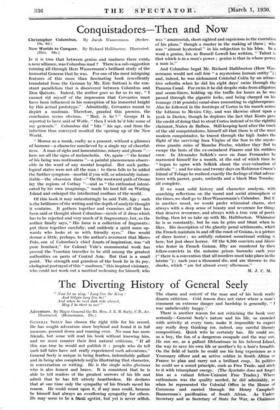Conquistadores Then and Now
IF it is true that between genius and madness there exists a near alliance, was Columbus mad ? There is a sub-suggestion running all through Herr Wassermann's brilliant study of the immortal Genoese that he was. For one of the most intriguing features of this more than fascinating book (excellently translated from the German by Mr. Eric Sutton) is the con- stant parallelism that is discovered between Columbus and Don Quixote. Indeed, the author goes so far as to say, " I cannot rid myself of the impression that Cervantes must have been influenced in his conception of his immortal knight by this actual prototype." Admittedly, Cervantes meant to depict a madman. Therefore, granted this premiss, the conclusion seems obvious. " Mad, is he ? " George II is reported to have said of Wolfe, " then I wish he'd bite some of my generals." Columbus did " bite " his age, and from the infection thus conveyed resulted the opening up of the New World.
" Morose as a monk, crafty as a peasant, without a glimmer of humour—a character unrelieved by a single ray of cheerful- ness. A man of sighs and lamentations, misery and gloom "— here are all the signs of melancholia. Or, again—" the kernel of his being was restlessness "—a painful phenomenon observ- able in the ward of any mental hospital. But such patho- logical states were not all the man : to them falls to be added the further symptom—morbid if you will, or admirably indom- itable—the obsession that—" On the westward path of Ocean lay the regions of Cathay "—and so " the enthusiast intoxi- cated by his own imaginings," made his land fall on Watling Island and enlaiged the intellectual confines of the world. .
Of this book it may unhesitatingly be said Tolle, lege ; such is the brilliance of the writing and the depth of analytic thought it contains. It gathers together and examines all that has been said or thought about Columbus—much of it dross which has to be rejected and very much of it fragmentary, but, as the author finally says, " His fame is a collection of fragments : put them together carefully, and suddenly a spirit soars up- wards who looks at us with friendly eyes." One would demur a little, perhaps, to the author's averment that Marco Polo, one of Columbus's chief founts of inspiration; was "all pure bombast," for Colonel Yule's monumental work has proved the Venetian traveller to be still among the greatest authorities on parts of Central Asia. But that is a small point The strength and grandeur of the book lie in its psy_ chological portrayal of this " madman," this inspired visionary, who could not work out a nautical reckoning for himself, who
was " amateurish, short-sighted and capricious in the execution of his plans," though a master in the making of them ; who was " almost hysterical " in his subjection to his Idea. In a word a genius, for, as Russell Lowell has written, " Talent is that which is in a man's power ; genius is that in whose power a man is."
And Columbus begat Mr. Richard Halliburton (Herr Was. sermann would not call him " a mysterious human entity ") ; and, indeed, he was nicknamed Cristobal Colon by an attrac- tive senorita when he did his eight days' swim through the Panama Canal. For swim it he did despite risks from alligators and ocean-liners, holding up the, traffic for hours as he was passed through the gigantic locks, and being charged on his tonnage (140 pounds) canal-dues amounting to eighteenpence. Also he followed in the footsteps of Cortes in his march across the Isthmus to Mexico City, and was likewise silent upon a peak in Darien, though he deplores the fact that Keats gave the credit of doing that to stout Cortes instead of to the rightful claimant, Nuilez de Balboa. Still keeping hard after the track of the old conquistadores, himself all that there is of the most modern conquistador, he traced through the high Andes the flight of the surviving Inca Virgins of the Sun to the myste- rious granite ruins of Manchu Picchu, whither they fled to escape the lusts of the ex-swineherd Pizarro and his ruthleis crew. In Alexander Selkirk's cave on Juan Fernandez he marooned himself for a month, at the end of which time he " began to agree with Selkirk about the over-valuation of solitude " ; and for nine and twenty days on Robinson Crusoe's Island of Tobago he realized exactly the feelings of that adven- turer with parrot, goats, umbrella and a black Man Toosday all complete.
If we want solid history and character analysis, with searching reflections on the moral and social atmosphere of the times, we shall go to Herr Wassermann's 'Columbus. But if, in another mood, we would prefer whimsical charm, shot always with a deep sense of beauty and reverence for things that deserve reverence, and always with a true vein of poetic feeling, then let us take up with Mr. Halliburton. Whimsical he is so constantly, but he can be grim and blunt when he likes. His description of the ghastly penal settlements, which the French maintain in and off the coast of Guiana, is a picture of sheer horror ; no artfully coloured sensational writing is here,. but just sheer horror. Of the 6,500 convicts and liberes who fester in French Guiana, fifty are murdered by .their fellow-convicts in the noisome prison barracks each year (" there is a convention that all murders must take place in the latrine ") ; each year a thousand die, and are thrown to the sharks, which " are fed almost every afternoon."
M. J. C. M.
























































 Previous page
Previous page